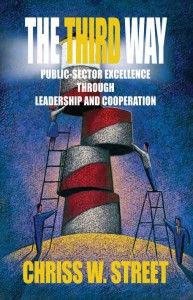Book Review: The higher Street to public management
by CalWatchdog Staff | May 14, 2012 3:49 pm
 [1]May 14, 2012
[1]May 14, 2012
By Wayne Lusvardi
When I first started working for Los Angeles County government decades ago, it was what might have been called “republican” (with a small “r”). Decision-making was delegated down to the managerial and supervisorial level. Generally speaking, managers were competent and non-manipulative and co-workers were cooperative and not overly protective of organizational turf. There were scandals and cover-ups, but not institutionalized such as the recent scandals at the city of Bell, Calif[2].
By the time that Gov. Pete Wilson left office in 1999 in California, government at nearly all levels in California had turned to what might be called “democratic” management — micromanaged from the top for the career advancement of the CEO and the enlargement of power of unions and politicians in the party of government. Managers were selected not on competence, but on meeting some quota to avoid a discrimination lawsuit.
Government administration shifted from cooperation and leadership to command and control, especially of tightly guarded secrets. And the more secretive the organization became, the more that managers became bullies and co-workers became back stabbers. I learned that the “doors of hell are locked from the inside,” as British writer C.S. Lewis once put it.
Chriss Street’s new book, “The Third Way: Public Sector Excellence Through Leadership and Cooperation[3],” is an antidote to the above-described bureaucratization and politicization of government. Chriss was elected as the reasurer-tax collector of Orange County, Calif. in 2006, and left office in 2010.
Orange County bankruptcy
This was the same office held by the infamous Bob Citron[4], the top Democrat to hold political office in Orange County in the early 1990’s. Citron’s highly risky strategies of using borrowed money to invest — called leveraging — where why Orange County declared Chapter 9 bankruptcy in 1994. Citron was a managerial star for earning high interest on investments, allowing cities to avoid having to raise taxes. He was reelected several times. But with high investment returns also came high risk.
Citron was the manager of the County General Fund, the Investment Pool and what was called the Co-Mingled Pool Fund. The highly leveraged position of his investments in repos (repurchase agreements) and floating rate notes (FRN’s) blew up when federal interest rates rose in 1994, requiring the county to make extra margin payments or post collateral. Citron’s investment strategy was found to be a house of cards that collapsed with nothing to back it.
Citron concealed the excess earnings of his investment funds and eventually pled guilty to felony charges and filing a false and misleading financial summary to investors in the Orange County Investment Pool. The County had to fire 3,000 employees, retirement funds were jeopardized, and county services had to be cut across the board.
Chriss Street[5] served as an overseer of the Orange County Public Employee’s Pension Plan where he exposed the risky trading strategies of Bob Citron and repositioned its assets after Citron left office. Chriss resigned from the Pension Plan in 1998, leaving it as one of the few over-funded pension plans in the United States.
The ‘Third Way’
In his book, Street outlines a “Third Way” to manage public sector organizations that is between private- and public-sector management models. The focus of Street’s book is not on bureaucracy, but how to administrate a public agency with greater efficiency and transparency.
Street defines his Third Way as replacing “command and control” type management with a “shared authority model of cooperation and leadership.”
Chriss tells how he canceled all vacations during peak trading weeks and mobilized the other sections of the treasurer’s department to handle peak overload and reduce worker stress.
He has other stories to tell. Some are humorous. But Chriss never laughs at his employees. He laughs with them.
He tells the story of how he requested the carpet to be cleaned in the public service area of the treasurer’s office when he first arrived on the job. He rejected the work and asked that it be steam-cleaned. The maintenance personnel said there was no steam-cleaning equipment available. When Chriss said he was going to contract out the service, a steam cleaner “miraculously” appeared! The carpet was so bad that its original ornamental pattern was covered in dirt. Later Chriss found that over-watering plants in the office caused the infestation of billions of tiny brine shrimp under the carpets.
Chriss’ book is filled with many stories of how business processes were improved, how hardware acquisitions were improved, barriers to communication were broken down, turf wars were reduced and costs were reduced — and probably most importantly, how transparency was communicated to the public.
Let Chriss tell you the rest of the story himself in his book. It’s available in a Kindle[6] version for $9.99 at Amazon.com. A paperback copy is here[7]. Read it. It’s a keeper.
- [Image]: http://www.calwatchdog.com/2012/05/14/book-review-the-higher-street-to-public-panagement/chriss-street-third-way-cover-2/
- city of Bell, Calif: http://en.wikipedia.org/wiki/2010_City_of_Bell_salary_controversy
- The Third Way: Public Sector Excellence Through Leadership and Cooperation: http://www.amazon.com/The-Third-Way-Public-Sector-Cooperation/dp/098427524X/ref=sr_1_1?ie=UTF8&qid=1337034335&sr=8-1#_
- Bob Citron: http://en.wikipedia.org/wiki/Robert_Citron
- Chriss Street: http://www.chrissstreetandcompany.com/about/
- Kindle: http://www.amazon.com/The-Third-Way-Public-Sector-ebook/dp/B0061MSQG6/ref=sr_1_cc_1?s=aps&ie=UTF8&qid=1336848126&sr=1-1-catcorr
- copy is here: http://www.amazon.com/The-Third-Way-Public-Sector-Cooperation/dp/098427524X/ref=sr_1_1?ie=UTF8&qid=1337034335&sr=8-1#_
Source URL: https://calwatchdog.com/2012/05/14/book-review-the-higher-street-to-public-panagement/